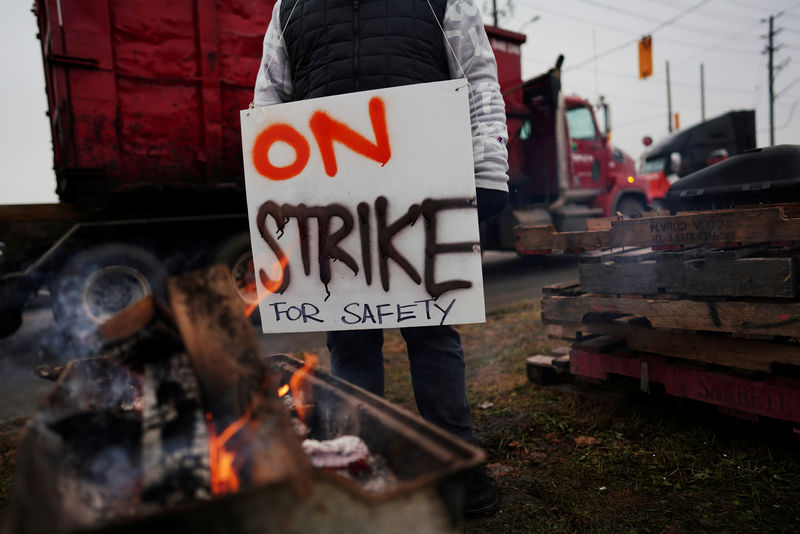By Allison Lampert and Kelsey Johnson
MONTREAL, OTTAWA (Reuters) - A strike at Canada's biggest railroad, Canadian National Railway Co, entered its fourth day on Friday as talks continued with no signs of a deal and analysts warned that a prolonged dispute would weigh on economic growth.
Some 3,200 unionized employees with the Teamsters, including conductors and yard workers, were hitting picket lines to demand better working conditions and changes they say would make the job safer.
Canada's biggest rail strike in a decade has sparked concerns that farmers and homeowners may run short of propane, although the union claims the railroad has manufactured that shortage.
The strike has also slowed output at industrial plants and triggered pleas from government and industry for Canadian Prime Minister Justin Trudeau's government to force the railroad workers back to their jobs.
Canada also relies on CN and Canadian Pacific Railway to move crops, potash, coal and manufactured goods to ports and the United States. Industry figures show that around half of the country's exports move by rail.
The strike has curbed oil shipments by rail during a period where full pipelines have already forced Alberta to curb production.
The Teamsters said in a statement on Friday that "no substantive progress has been made on the union's key workplace safety and health issues," including worker fatigue and limiting the use of beltpacks while standing outside the car to remotely control trains.
Economists warned on Friday that a prolonged strike could hit already slowing growth expected by year's end.
A five-day strike could cost the Canadian economy between C$800 million ($603 million) and C$1.1 billion annualized in the fourth quarter, TD Bank’s senior economist, Brian DePratto, said by email.
"We were already expecting real Q4 growth of only 1.0%, so an extended strike risks seeing a near flattening in economic activity to finish the year, and hit an already-challenged goods sector," said CIBC's Avery Shenfeld in a note.
FARMERS PROTEST
The Canadian Federation of Independent Business urged Trudeau's government to take steps to pass back-to-work legislation if the strike was not resolved by early next week. Other hard-hit sectors like agriculture, forestry and mining, have made similar requests.
Premier Doug Ford of Ontario, Canada's most populous province, said he had discussed the strike with Trudeau at a meeting in Ottawa on Friday. He urged for an immediate fix to the strike, since back-to-work legislation would take time to approve.
Trudeau, who was re-elected in late October, has yet to reconvene Parliament, and several procedural steps would be needed before such legislation could be introduced.
The Teamsters suggested CN was manufacturing the propane shortage by choosing not to transport the product.
"While CN is nowhere near operating at full capacity, we think enough trains are running to allow CN to supply Ontario and Quebec with propane," said Lyndon Isaak, president of the Teamsters Canada Rail Conference.
Industry and the premier of Quebec have expressed alarm at the shortage of propane.
In Quebec's Montérégie region, frustrated farmers who rely on propane to dry their crops and heat livestock barns protested the CN strike, saying the situation could have been avoided and urging a resolution.
A CN spokesman could not be immediately reached for comment.
Montreal-based CN has proposed binding arbitration, an option that the union has rejected.

CN stock was down 0.5% by midday, taking this week's losses to about 5%, while the Toronto exchange rose 0.8%.